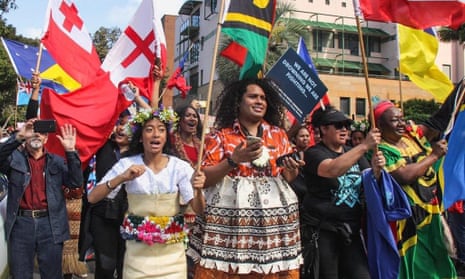Living in Australia as a Pacific Islander means every weekend there’s a social gathering to attend, whether it’s a birthday, wedding, fundraiser for someone’s medical treatment or a traditional rite of passage.
More recently, however, the community get-togethers to mobilise our people have been to push for stronger climate action and have a more sombre undertone.
Today, my Pacific brothers and sisters will gather at Parliament House in solidarity with First Nations people, and with the families affected by the bushfires this summer to call the Minerals Council out for being notorious climate wreckers and to lobby for the Australian government to cut all ties with them. The Australian government needs to acknowledge that the trail of destruction is at their doorstep.
It saddens me that despite all the work we have done globally in this movement, we are still struggling for survival. We’re witnessing the trail of destruction that the Pacific has been faced with in Australia already.
In the last 10 years, the Pacific Islands have experienced 77 intense tropical cyclones, which claimed a total of 141 lives; 12 of these tropical cyclones occurred during the off-season. Compared with other countries, these numbers may not seem like a lot, but when you consider that the total population in the South Pacific is a mere 2.5 million, those numbers hit hard.
More frequent and far more intense natural disasters have left a trail of physical and emotional destruction, spanning from the Pacific Islands, and now breathing down our necks here in Australia.
For years now, Pacific Island governments have been pleading with more developed countries to phase out the use of fossil fuels and rapidly transition to cleaner sources of energy. It is the larger industrialised countries that are most responsible for emitting large numbers of greenhouse gasses into the atmosphere, causing climate change and wreaking havoc upon our nations in the Pacific.
The average global sea surface temperature has increased approximately 0.13 degrees per decade.
Data from the US National Oceanic and Atmospheric Administration (NOAA) shows that the average global sea surface temperature – the temperature of the upper few metres of the ocean – has increased by approximately 0.13°C per decade.
It’s Newton’s third law: there will be a reaction.
Climate change means extreme weather events, loss of life and property, species and ecosystem loss, and sadly, forced migration.
No regions will be spared the effects of climate change. Some of the areas now regarded as “safer” may suffer huge direct and indirect consequences. That said, the Pacific region will be especially hard hit by warming. We are already seeing some places, such as Kiribati and the Marshall Islands becoming unfit for human life due to temperature increase.
This trail of destruction caused by the fossil fuel industry is becoming more and more evident in Australia as bushfires have raged all across the country. Climate change and global heating definitely make fires much more likely, and much more intense when they happen.
As a Pacific Island woman, who has, and continues to witness the horrors of how challenging it is to survive under these conditions, I urge the Australian government to immediately cease its support for the fossil fuel industry.
There needs to be an immediate end to subsidies and other direct and indirect funding to fossil fuel industries. Instead, these resources should be diverted to a just transition to a much less destructive renewable energy infrastructure.
If we are to ensure the survival of the Pacific people, and Australians, we need to see immediate and urgent action before more damage is done.
Jacynta Fuamatu is a Samoan Australian artist, fashion designer and serves on the Council of Elders for the Pacific Climate Warriors and is an organiser for 350.org Australia.
